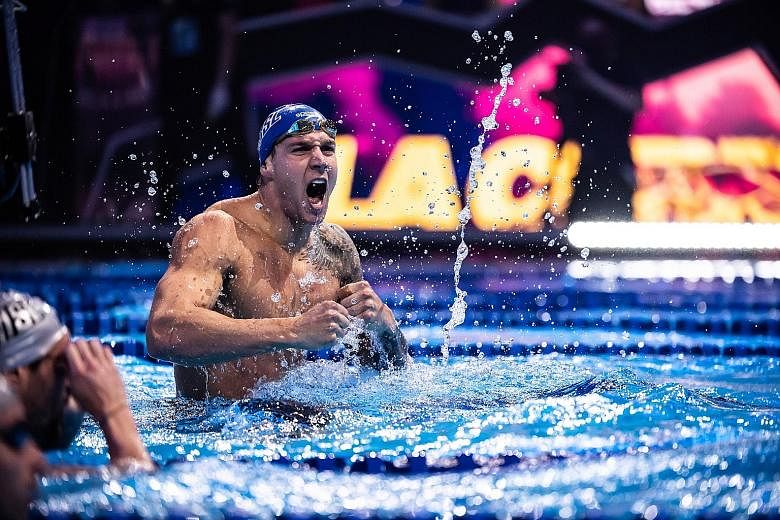BUDAPEST • Caeleb Dressel's record time disappeared from the scoreboard at Duna Arena almost as fast as he could check it, vanishing as if it were an unsightly stain wiped clean by an unseen hand.
The scoreboard was not malfunctioning. In fact, it was working to perfection.
While the potential of six-figure paydays was probably the most powerful draw in luring some of the world's top professionals to the International Swimming League's (ISL) bubble in Budapest recently, so, too, was a format that put racing above records.
After each event, the scoreboard purposely flashes the results for only a few seconds and then erases them, leaving only the order of finish beside the racers' names. The change has confused fans, but the athletes aren't complaining.
In a year of closed pools, disrupted training and cancelled competitions, it has been liberating, several top swimmers said, to be freed from the tyranny of times.
"It is a huge relief to not be able to really compare times to what I'm used to doing," said Abbey Weitzeil, who has twice broken the American record in the 50m freestyle here. "It's a huge opportunity for us to turn our brain off the clock and just race."
For Dressel, who was poised for stardom at the Olympics before the Tokyo Games were pushed back to next summer, the ISL races have transported him back in time, to his swimming origins at recreational league meets in Jacksonville, Florida.
Back then, he got his start by jumping into an unoccupied lane at one of his older brother's meets, stroking to the other side of the pool and exclaiming: "I won a medal! I won a medal!"
Many more medals would follow as Dressel rewrote the national age-group record books. But he soon found himself consumed by the clock, distilling hours and days and weeks of training down the fractions of a second he needed to break the marks then held by 23-time Olympic gold medallist Michael Phelps.
Last year, Dressel broke his first long-course world record in the 100m butterfly. But the 24-year-old said he was convinced he could have lowered the record two years earlier if not for his preoccupation with the clock.
"I was so caught up in Michael's time instead of what I was capable of going," he added.
Last Saturday, he set short-course world records in the 100m butterfly - his time of 47.78sec broke South African Chad le Clos' mark of 48.08 - and 50m freestyle - he rewrote his mark by 0.08 after recording 20.16sec.
The ISL races, he and other swimmers said, have been a welcome diversion from record mania and personal-best blues.
"It was a really exciting day and I'm so pleased with the times," the American told the BBC. "It's like an amusement park for swimmers and I'm loving it at the ISL this season, but we want to win this as a team - that's the end goal."
Lia Neal, his Cali Condors teammate and a two-time Olympic medallist said: "Mentally it gives you a break from overemphasising times and numbers. Rather than constantly trying to go a best time, you can be in the moment."
The problem is that elite swimmers are programmed to measure their daily progress by the ticks of pace clocks, scoreboards and stopwatches. From the time youngsters cast their eyes on "A" standards or age-group records, an obsession with the clock is swimming's time-honoured tradition.
The downside of always racing against the clock is that the clock ultimately wins and everyone eventually hits a plateau.
Not even Phelps was immune; while he continued to collect Olympic medals by the handful late in his career, he did not post a best time in any of his primary events after 2009.
In a year when simply finding an open pool has sometimes been difficult, Dressel said that he had embraced the ISL because it has offered the rare chance to keep his focus where he believes it belongs.
The records - the world and Olympic champion became the first swimmer to break 50 seconds in the 100m individual medley last Monday - have still come, but they have been a bonus, not the goal.
"It truly is about racing, the age-group mindset," he said. "I don't want to ever lose that, even with money getting involved, even with media getting involved, all the travel and appearances. I want to keep the same mindset of a 12-year-old."
NYTIMES, REUTERS

